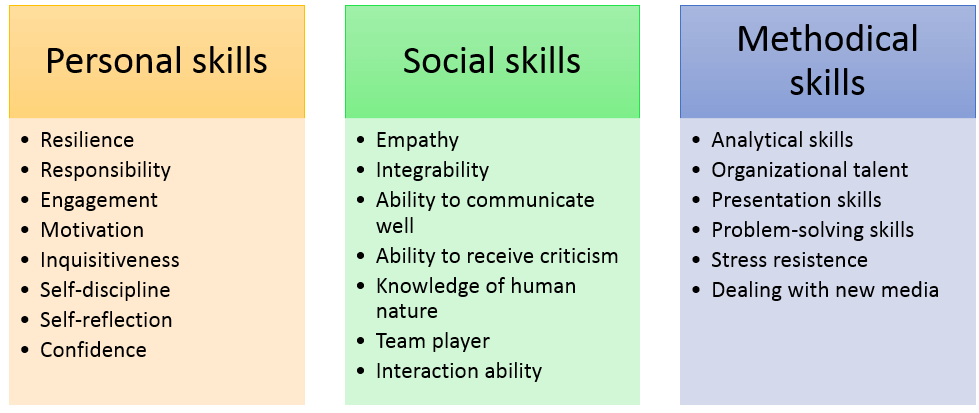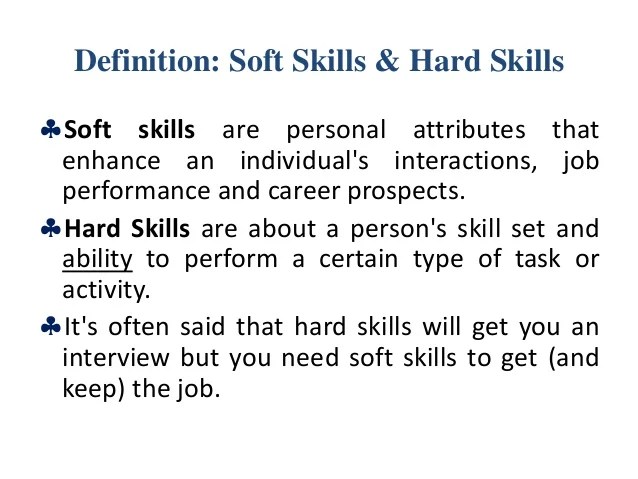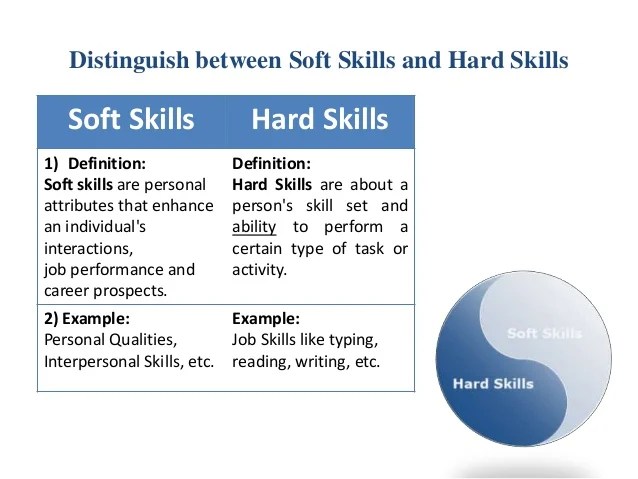Types of soft skills include curiosity, initiative, persistence, adaptability, leadership and social or cultural awareness. Soft skills are a cluster of productive personality traits that characterize one’s relationships both personal and professional.
Simple What Is The Soft Skills Meaning Ideas 2022, They differ from hard skills in that they cannot be taught in a holistic way. Keeping the significance of emotional intelligence in mind, we have provided a list of.
 Technical Skills List, Definition & Examples List of skills, Resume From pinterest.com
Technical Skills List, Definition & Examples List of skills, Resume From pinterest.com
Types of soft skills include curiosity, initiative, persistence, adaptability, leadership and social or cultural awareness. In the workplace, soft skills are considered a complement to hard skills. A person with high emotional intelligence has the ability to interpret, comprehend and manage the emotions of both themselves. Hiring managers typically look for job.
Technical Skills List, Definition & Examples List of skills, Resume Types of soft skills include curiosity, initiative, persistence, adaptability, leadership and social or cultural awareness.
Soft skills are less tangible. Also known as people skills or interpersonal skills , soft skills relate to the way you relate to and interact with other people. Soft skills are a cluster of productive personality traits that characterize one’s relationships both personal and professional. Creative thinking skills are the mental process involved in solving a problem or creating a product.
 Source: slideshare.net
Source: slideshare.net
Adaptability, cognitive ability, communication, creativity, critical thinking, conflict resolution, decision making, flexibility, integrity, leadership, motivation, research, time management and problem solving. In the workplace, soft skills are considered a complement to hard skills. Whereas you may be able to take a series of courses on skills like woodworking, you cannot learn soft skills. These skills include divergent thinking and convergent thinking skills. Soft skills.
 Source: pinterest.com
Source: pinterest.com
Unlike hard skills, it's hard to point to specific evidence that you possess a soft skill. Soft skills are a cluster of productive personality traits that characterize one's relationships in a social environment. Soft skills relate to how you work. While hard skills are crucial for effective product management, a lack of certain skills can make leadership more of a challenge. Technical Skills List, Definition & Examples List of skills, Resume.
 Source: allevents.in
Source: allevents.in
Soft skills are general attributes that aren’t specific to a job or industry. Soft skills in a workplace are best described as the skills you have which relate to how you work with others and how you apply yourself to the job. Keeping the significance of emotional intelligence in mind, we have provided a list of. What are soft skills in business? Soft Skills for Professional Development, July 28 2020 Online Event.
 Source: searchcio.techtarget.com
Source: searchcio.techtarget.com
While hard skills are crucial for effective product management, a lack of certain skills can make leadership more of a challenge. What are soft skills in business? More than likely, your career will require you to interact with coworkers. Creative thinking skills are the mental process involved in solving a problem or creating a product. What is soft skills? Definition from.
 Source: pwblf.org
Source: pwblf.org
A person with high emotional intelligence has the ability to interpret, comprehend and manage the emotions of both themselves. Unlike technical skills, which are often referred to as hard skills, soft skills are not learned in a classroom as they are acquired through experience. A definition based on review literature. Some examples of soft skills which come under the work ethics category are: 6 Benefits of Soft Skills Courses PWBLF.
 Source: es.slideshare.net
Source: es.slideshare.net
Also, it’s important to understand how lacking soft skills can lead to an atmosphere of fear and blame that prevents people from being their best. How soft skills differ from hard skills. These skills can include social graces, communication abilities, language skills, personal habits, cognitive or emotional empathy, time management, teamwork and leadership traits. There is no denying that well rounded and comprehensive groomed soft skills are considered essential for success in any profession. How to Teach Soft Skills.
 Source: ionos.ca
Source: ionos.ca
Creative thinking skills are the mental process involved in solving a problem or creating a product. There is no denying that well rounded and comprehensive groomed soft skills are considered essential for success in any profession. Adaptability, cognitive ability, communication, creativity, critical thinking, conflict resolution, decision making, flexibility, integrity, leadership, motivation, research, time management and problem solving. A definition based on review literature. Soft skills Definition and examples IONOS.
 Source: jobsearch.about.com
Source: jobsearch.about.com
Unlike technical skills, which are often referred to as hard skills, soft skills are not learned in a classroom as they are acquired through experience. What are soft skills in business? Soft skills, the topic of this lesson, are the subtle behaviors and communication styles that help make a work environment or interaction with another person easier to manage. These skills can include social graces, communication abilities, language skills, personal habits, cognitive or emotional empathy, time management, teamwork and leadership traits. Hard Skills vs. Soft Skills What's the Difference?.
 Source: slideshare.net
Source: slideshare.net
Unlike hard skills, it's hard to point to specific evidence that you possess a soft skill. More than likely, your career will require you to interact with coworkers. Creative thinking skills are the mental process involved in solving a problem or creating a product. Soft skills relate to how you work. Training…why Soft Skills are Important.
 Source: socialscotland.com
Source: socialscotland.com
Keeping the significance of emotional intelligence in mind, we have provided a list of. Creative thinking skills are the mental process involved in solving a problem or creating a product. Generally speaking the above sets of soft skills can be. Soft skills are general attributes that aren’t specific to a job or industry. Soft skills What are they? Dr Simone Kurtzke.
 Source: lisbonlx.com
Source: lisbonlx.com
While hard skills are crucial for effective product management, a lack of certain skills can make leadership more of a challenge. Creative thinking skills are the mental process involved in solving a problem or creating a product. Soft skills include interpersonal (people) skills, communication skills, listening skills, time management, and empathy, among others. As a category, communication skills help you convey information to other people as well as absorb what others share with you. Definition Of Great Customer Service Examples and Forms.
 Source: slideshare.net
Source: slideshare.net
Soft skills are a cluster of productive personality traits that characterize one’s relationships both personal and professional. Soft skills, the topic of this lesson, are the subtle behaviors and communication styles that help make a work environment or interaction with another person easier to manage. Soft skills include interpersonal (people) skills, communication skills, listening skills, time management, and empathy, among others. Some examples of soft skills that are desirable in the workplace include; Soft skills.
 Source: slideshare.net
Source: slideshare.net
Divergent thinking skills are needed to create. Soft skills are a cluster of productive personality traits that characterize one's relationships in a social environment. Adaptability, cognitive ability, communication, creativity, critical thinking, conflict resolution, decision making, flexibility, integrity, leadership, motivation, research, time management and problem solving. These skills can include social graces, communication abilities, language skills, personal habits, cognitive or emotional empathy, time management, teamwork and leadership traits. SoftSkills Main Aspects and Benefits.
 Source: slideshare.net
Source: slideshare.net
Also known as people skills or interpersonal skills , soft skills relate to the way you relate to and interact with other people. Unlike technical skills, which are often referred to as hard skills, soft skills are not learned in a classroom as they are acquired through experience. While hard skills are crucial for effective product management, a lack of certain skills can make leadership more of a challenge. Soft skills are a cluster of productive personality traits that characterize one's relationships in a social environment. 201111 Why IT Professionals Need Soft Skills.
 Source: slideshare.net
Source: slideshare.net
While hard skills are crucial for effective product management, a lack of certain skills can make leadership more of a challenge. Some of the soft skills that are included in its broader category are. Also known as people skills or interpersonal skills , soft skills relate to the way you relate to and interact with other people. They differ from hard skills in that they cannot be taught in a holistic way. Soft Skills Preparation for the Canadian Workplace.
 Source: slideshare.net
Source: slideshare.net
In the workplace, soft skills are considered a complement to hard skills. Soft skills are a broad term that denotes the ability to communicate with others cordially. It can also help to develop their listening and empathy skills which are key when dealing with customers or clients, especially if faced with a potentially complex problem. Unlike technical skills, which are often referred to as hard skills, soft skills are not learned in a classroom as they are acquired through experience. Mca i ecls_u1_introduction and basics of soft skills.
 Source: slideshare.net
Source: slideshare.net
These are key soft skills, among many others. In the workplace, soft skills are considered a complement to hard skills. Having a strong work ethic means the person acknowledges is position and does the job assigned to him honestly and diligently with all the accountability. It can also help to develop their listening and empathy skills which are key when dealing with customers or clients, especially if faced with a potentially complex problem. Llb i ecls_u1_introduction and basics of soft skills.
 Source: thebalancecareers.com
Source: thebalancecareers.com
Adaptability, cognitive ability, communication, creativity, critical thinking, conflict resolution, decision making, flexibility, integrity, leadership, motivation, research, time management and problem solving. Soft skills are a cluster of productive personality traits that characterize one's relationships in a social environment. They are among the top skills employers seek in the candidates they hire, because soft skills are important for just about every job. Soft skills in a workplace are best described as the skills you have which relate to how you work with others and how you apply yourself to the job. Soft Skills What Are They?.
 Source: geektonight.com
Source: geektonight.com
Some examples of soft skills which come under the work ethics category are: How soft skills differ from hard skills. They differ from hard skills in that they cannot be taught in a holistic way. Adaptability, cognitive ability, communication, creativity, critical thinking, conflict resolution, decision making, flexibility, integrity, leadership, motivation, research, time management and problem solving. What Are Soft Skills? Types, Importance, How To Develop.
 Source: jarthur.co
Source: jarthur.co
As a category, communication skills help you convey information to other people as well as absorb what others share with you. Also known as people skills or interpersonal skills , soft skills relate to the way you relate to and interact with other people. Leadership is one of the most important transferable skills to possess. These skills can include social graces, communication abilities, language skills, personal habits, cognitive or emotional empathy, time management, teamwork and leadership traits. Hard Skills vs Soft Skills and the importance of both.
 Source: feedough.com
Source: feedough.com
These skills can include social graces, communication abilities, language skills, personal habits, cognitive or emotional empathy, time management, teamwork and leadership traits. A person with high emotional intelligence has the ability to interpret, comprehend and manage the emotions of both themselves. Today, soft skills are viewed as a wide range of skills that focus on social relationships, work. Adaptability, cognitive ability, communication, creativity, critical thinking, conflict resolution, decision making, flexibility, integrity, leadership, motivation, research, time management and problem solving. Soft Skills Definition, Importance, List, & Examples Feedough.
 Source: wikijob.co.uk
Source: wikijob.co.uk
Soft skills include interpersonal (people) skills, communication skills, listening skills, time management, and empathy, among others. A person with high emotional intelligence has the ability to interpret, comprehend and manage the emotions of both themselves. Some examples of soft skills which come under the work ethics category are: Soft skills are transferable skills, meaning they can be used in almost every area of work and in every position. The 10 Most Important Soft Skills for 2020, With Examples.
 Source: slideshare.net
Source: slideshare.net
A person with high emotional intelligence has the ability to interpret, comprehend and manage the emotions of both themselves. Keeping the significance of emotional intelligence in mind, we have provided a list of. Soft skills relate to how you work. Soft skills in a workplace are best described as the skills you have which relate to how you work with others and how you apply yourself to the job. MBA I ECLS_U1_introduction and basics of soft skills.
 Source: slideserve.com
Source: slideserve.com
A soft skill is a personal attribute that supports situational awareness and enhances an individual's ability to get a job done. This may include great communication, emotional intelligence, empathy, work ethic, and teamwork. Soft skills, the topic of this lesson, are the subtle behaviors and communication styles that help make a work environment or interaction with another person easier to manage. Whereas you may be able to take a series of courses on skills like woodworking, you cannot learn soft skills. PPT SOFT SKILLS PowerPoint Presentation, free download ID5354441.
 Source: nintyninepercent.com
Source: nintyninepercent.com
Soft skills include interpersonal (people) skills, communication skills, listening skills, time management, and empathy, among others. Soft skills in a workplace are best described as the skills you have which relate to how you work with others and how you apply yourself to the job. Today, soft skills are viewed as a wide range of skills that focus on social relationships, work. How soft skills differ from hard skills. Hard Skills vs. Soft Skills Understanding the Benefits of Both.
Types Of Soft Skills Include Curiosity, Initiative, Persistence, Adaptability, Leadership And Social Or Cultural Awareness.
To become a soft skills master, you’ll first have to understand the meaning of soft skills and the role they play in our lives at work and with teams. People's abilities to communicate with each other and work well together: A person with high emotional intelligence has the ability to interpret, comprehend and manage the emotions of both themselves. Generally speaking the above sets of soft skills can be.
Leadership Is One Of The Most Important Transferable Skills To Possess.
As a category, communication skills help you convey information to other people as well as absorb what others share with you. Whereas you may be able to take a series of courses on skills like woodworking, you cannot learn soft skills. The meaning of soft skills involves interpersonal communications skills, social relationships, use of language, kindness and graces, personality, personal habits, optimism, work ethic, attitude, and emotional intelligence quotient (eq). Soft skills, on the other hand, are subjective skills that are much harder to quantify.
Soft Skills Are Transferable Skills, Meaning They Can Be Used In Almost Every Area Of Work And In Every Position.
These skills can include social graces, communication abilities, language skills, personal habits, cognitive or emotional empathy, time management, teamwork and leadership traits. Soft skills, the topic of this lesson, are the subtle behaviors and communication styles that help make a work environment or interaction with another person easier to manage. Having a strong work ethic means the person acknowledges is position and does the job assigned to him honestly and diligently with all the accountability. Some of the soft skills that are included in its broader category are.
Also Known As People Skills Or Interpersonal Skills , Soft Skills Relate To The Way You Relate To And Interact With Other People.
It can also help to develop their listening and empathy skills which are key when dealing with customers or clients, especially if faced with a potentially complex problem. Soft skills include interpersonal (people) skills, communication skills, listening skills, time management, and empathy, among others. Hiring managers typically look for job. They are among the top skills employers seek in the candidates they hire, because soft skills are important for just about every job.







